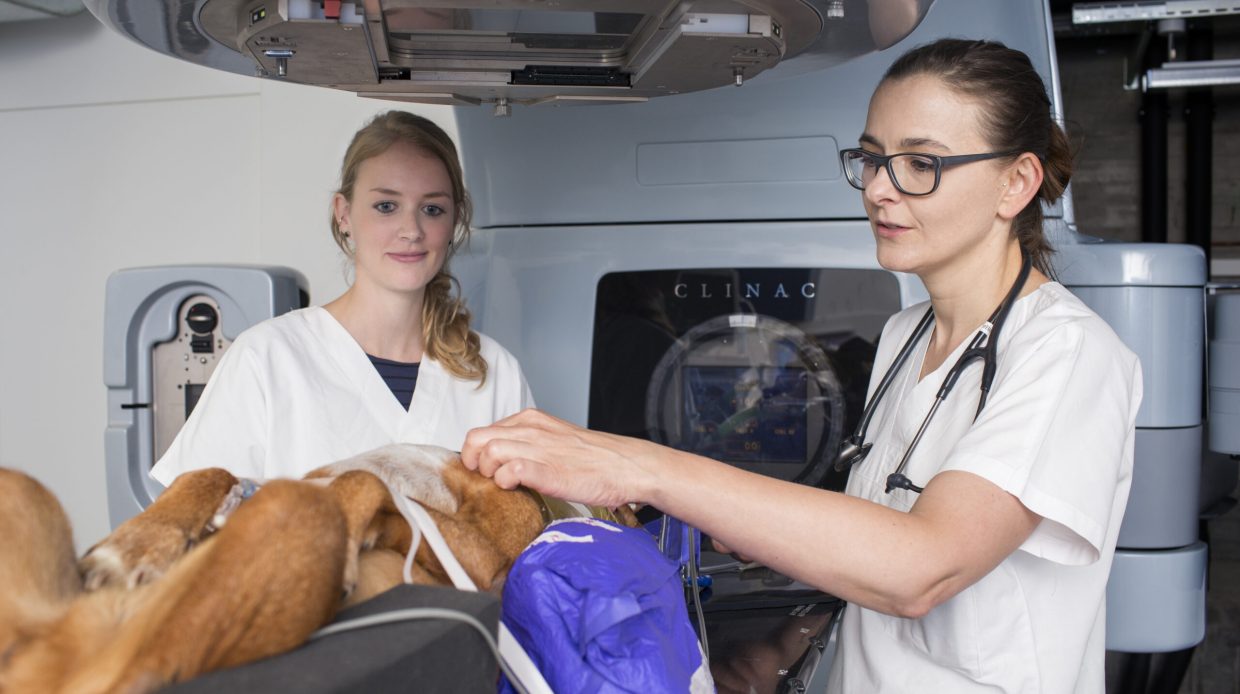Cancer and tumors: Division of Radiation Oncology
All employees of the department dedicate themselves day by day to excellent patient care in the clinic, as well as to research, teaching, and training. We guarantee our cancer patients individualized treatment based on the latest scientific and technological standards.

Every member of our department team works to provide excellent patient care through our research, teaching, and training and in our clinic. We guarantee that your pet will receive individual treatment that meets the latest scientific and technical standards. Our team works in close cooperation with your referring veterinarian and interdisciplinary specialists in our hospital to create comprehensive treatment plans. It is important to us that we accompany our patients closely during treatment to ensure they remain comfortable.
Through our commitment to all aspects of radiation oncology research, we strive to give our present and future patients the best possible chance of recovery. This is the motivation for our work teaching, conducting clinical trials, and performing radiobiological research.
Training the specialists of tomorrow is at the core of teaching and training mission. We therefore often have a team of trainee colleagues from around the world and, together, we work to improve our knowledge and skills.
I personally stand behind these goals, together with my team.
Carla Rohrer Bley

About us
Any diagnosis of cancer is upsetting, of course. With modern treatment methods, many tumors can be cured or managed over the long term.
It is important to us that we can offer our patients the optimal treatment for their disease that best fits their individual situation. A good quality of life during and after treatment is our focus.
We are a team of veterinarians who specialize or are working towards specializations in in the various fields of oncology (cancer treatment). Together with our practice assistants, we provide close, personal support to you and your pet during and after treatment. We guarantee that our patients are treated according to the latest scientific findings and with the latest technology. A team of physicists and radiographers support our work in radiotherapy.
We offer consulting, testing, and treatment for animals with suspected cases of cancer. If treatment is possible, this may involve surgery, radiation, and/or chemotherapy, depending on the situation. A combination of treatments is frequently selected. We work closely with the referring veterinarian and our hospital offers a high degree of specialization in all disciplines to ensure the best care for our patients.
Clinical research is an important part of our commitment to advancing our knowledge and often we can offer our patients new treatment options while also gaining valuable insights into the fight against cancer. However, we will only ever provide treatments to which you give your consent.
Abteilung Radio-Onkologie
Kliniken für Kleintiere
Vetsuisse-Fakultät Universität Zürich
Winterthurerstrasse 260
CH-8057 Zürich
Termine für Patientenbesitzer:innen
+41 44 635 83 24
(evtl. Anrufbeantworter)
Kontakt für überweisende Tierärztinnen und Tierärzte
+41 44 635 95 55
Division of Radiation Oncology
Clinics for small animals
Vetsuisse Faculty of Universität Zürich
Winterthurerstrasse 260
CH-8057 Zürich
Appointments for patient owners
+41 44 635 83 24
(possibly answering machine)
Contact for referring veterinarians
+41 44 635 95 55
Our expertise
Text
Clinical research is an important part of our commitment to advancing our knowledge and often we can offer our patients new treatment options while also gaining valuable insights into the fight against cancer. However, we will only ever provide treatments to which you give your consent.
Current clinical studies:
- Squamous Cell Carcinoma of the Oral Cavity of the Cat: «Side Effects and Tumor Control of Ultrafast (FLASH) Proton Irradiation Compared to Conventional Speed Proton Therapy».
- Brain Tumors: «Chemoradiation for High-Grade Glioma».
- Nasal Cavity Tumors: «Heterogeneous Irradiation for Sinonasal Tumors».
Are you interested in our clinical studies? If you would like to learn more about our studies, please contact us.